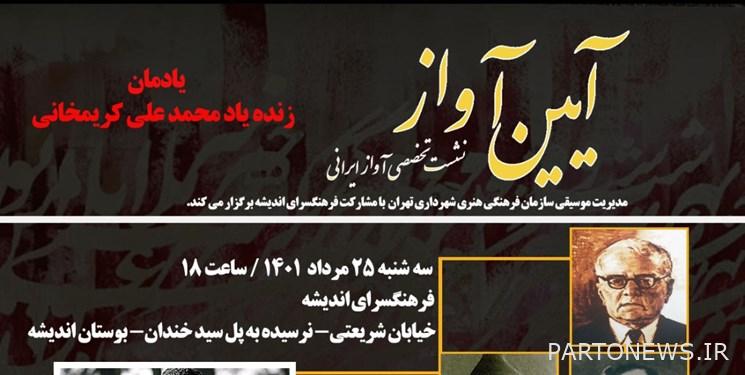The ritual of singing Yadaman Zind Yad Muhammad Ali Karimkhani Pir Gholam Ahl al-Bayt (AS)

According to Fars news agency, the 40th program of Iyen Awaz (specialized meeting of singing in instrumental music of Iran) will be held on Tuesday, August 25 at 6:00 PM in Farhangsarai Andisheh. This program will be conducted in several different sections with Ali Shirazi’s master and Hamid Sohrabi’s performance as follows. This program is dedicated to the living memory of Mohammad Ali Karimkhani.
The speakers of this meeting are Bahman Karimkhani (poet, singer and living son of Yad Mohammad Ali Karimkhani) and Reza Mahdavi (musician, researcher and centaur player).
The performances of this meeting are in four separate programs, including Amir Madah (vocals) and Hassan Jafar Tabar (reeds) / Mohammad Hashim Ahmad Vand (vocals), Pouria Khakpour (reeds) and Yusuf Ahmad Vand (drums) / Mehdi Mohammadi (vocals) and Zaman Khairy. (nii)/ Seyed Mohsen Hosseini (vocals) and Motamed Samani (oud)/ will be.
Ustad Mohammad Ali Karimkhani Madah and Pir Ghulam of Ahl al-Bayt (PBUH) was born in 1329 in Narjeh Takistan, Qazvin Province, he was interested in Madh and Muezni since childhood and during the months of Ramadan and Muharram, he practiced chanting and chanting on the radio. He experienced his first prayer at the age of 16 in the shrine of Imam Reza (a.s.). After he realized his abilities, he went to Tehran before he was young, and after that he devoted himself to singing professionally on the radio under the supervision of Hossein Sobhdel and accompanied by Mohammad Esfahani, Mohsen Hassanzadeh and Seyed Ahmad Hali. The reason for his acquaintance with Aziminejad was Mohammad Esfahani, and this acquaintance goes back to 2013, which resulted in several works under the authority of Imam Reza (a.s.) and the album Saqi Sarmast.
Karimkhani became famous in 2009 by singing a piece from heaven, or “I have come, O king, protect me – Khat amani za ghanam bede”. He said goodbye to Darfani on the evening of June 30 this year after a long illness at the age of 72. The body of Ustad Karimkhani was buried in his hometown, Qazvin province, Takestan city, Narje city, next to his parents. A few hours after the news of the death of Professor Karimkhani, Aziminejad wrote on his page in the virtual space: I am silent… as if my larynx has stopped working… as if I have lost my voice. Master Mohammad Ali Karimkhani joined his master. came The king has come to protect him.
Professor Karimkhani’s special feature in singing was his loud voice, which never diminished despite entering his seventh decade of life. The works he read were for Ahl al-Bayt (AS). Homayoun Shajarian has dedicated the song Man Kaja, Baran Kaja from the Iran Man album, which is based on the way Karimkhani sings, to him.
Ashurai’s Whisper and Hossein Aram Janam – Hossein Rooh and Ravanam are other works of the late Karimkhani. He always attributed his warm voice to the grace of God and the care of the Ahl al-Bayt (AS), and in this regard, he said in an interview with a media outlet: “My honor is that I use my voice only for the Ahl al-Bayt (AS). These are all God’s favors and God will hold us accountable that I gave you this voice, where did you use it?! I don’t want to turn away from God’s grace for the sake of fame and money.
Professor Karimkhani has also advised the Ahl al-Bayt (a.s.) praisers: I believe that what we recite should be in honor of Imam Hussain (a.s.) and the Ahl al-Bayt (a.s.). We must first see if what we read is worthy of these or not, lest they become smaller with what I want to read, and does what I read really stick to my heart?! My opinion is that it is not correct to recite open prayers. I prefer gesture, gesture and foreshadowing. We have all been at the pulpit since childhood, we all know how Imam Hussain (AS) was martyred, his tent was set on fire, it is not necessary for you to repeat these in every mosque, in every eulogy; Read a poem that says this on the screen, with allusions and metaphors; Sit down and choose a good poem and song so that the other four people who look at your hand will learn something. I emphasize that the madah should have new words and new poems that are suitable for the assembly, for example, in the birth of Imam Hossein (a.s.), they sing the massacre cemetery, which is wrong. The meaning is that we should be careful not to read anything that detracts from the dignity of Imam Hussain (AS).
Mohammad Ali Karimkhani started singing in religious gatherings since he was a child, and after he realized his abilities, he went to Tehran before he was young. The album “Drunken Butler” is one of his other works. Among his best works, we can mention “I have come, O king, protect me” and also “Ashurai Whispers, Hossein Aram Janam and Hossein Rooh and Ravanam”.
Mohammad Ali Karimkhani was very careful in choosing his poems, so that he would study many poems and check different Diwans for eulogizing in an assembly or a gathering, and with a certain precision, he would find beautiful, meaningful poems and poems from He used to anthologize the lofty soul of the poets. This obsession in choosing poetry distinguished Karimkhani’s work from others. He used all the capabilities of his voice and in other words, with all his heart and with a special strength and by choosing the most beautiful and at the same time the most suitable instrument and songs of authentic Iranian music, he presented noble and valuable works.
end of message/
You can edit this article
Suggest this article for the first page

